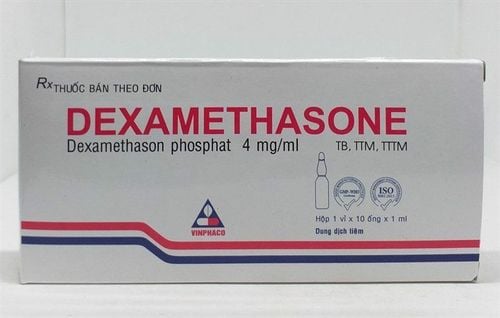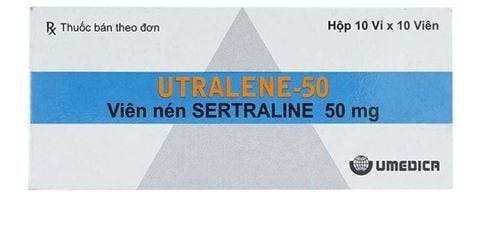This is an automatically translated article.
Zanamivir belongs to the group of antibacterial drugs and antiviral drugs with the main ingredient being Zanamivir. Zanamivir is used to treat symptoms caused by influenza virus (influenza) in cases where these symptoms appear within about 2 days.1. What is Zanamivir?
Zanamivir can help alleviate flu symptoms (such as stuffy nose, cough, sore throat, fever, chills, headache and body aches, fatigue) and shorten recovery time by about 12 days.Zanamivir is prepared and packaged in 2 forms: injectable and inhaled powder. With the content of the main ingredient Zanamivir is 10g/ml and 5mg/dose, respectively. Zanamivir works by stopping the growth of the virus. However, it is not a substitute for flu vaccines. In addition, Zanamivir does not reduce the risk of infecting other people with the flu.
With its use, Zanamivir is indicated for use in children ≥ 5 years old and adults in the following cases:
Inhalation powder: Treatment of influenza A and influenza B virus infections; Prophylactic treatment of influenza A and influenza B viruses; Support against seasonal influenza A and B during community outbreaks. Injectable: Treatment of complicated and potentially life-threatening influenza A or B virus infections in adult and pediatric patients (từ 6 months of age) when: The strain of influenza virus to which the patient is infected is known. or suspected resistance to other anti-influenza drugs; Other antiviral medicinal products for the treatment of influenza, including inhaled zanamivir, are not suitable for sick people. Zanamivir currently has no information on contraindications for use. However, it is still advisable to consult your doctor before deciding to use the drug.
2. Instructions on how to take Zanamivir
2.1. How to use
Treatment with Zanamivir should be started as soon as possible and usually within 6 days of the onset of flu symptoms. When using Zanamivir inhaled powder, other inhalers such as asthma medications, should be used before taking Zanamivir inhaled Zanamivir by mouth, can use the assistive device provided, and a blister for each inhalation. Zanamivir injection is given by intravenous infusion over 30 minutes.2.2. Dosage
AdultsZanamivir inhalation powder : Treatment of influenza: The recommended reference dose is 10mg/time x 2 times/day x 5 days. Post-exposure prophylaxis: The recommended reference dose is 10mg/time x 2 times/day x 10 days. Support for prevention of seasonal flu: The recommended reference dose is 10mg/time x 2 times/day x 28 days. Zanamivir Injection: The recommended reference dose in adults is 600 mg x 2 times/day x 5 - 10 days by intravenous infusion. Children:
Zanamivir inhalation powder: Treatment of flu: The recommended dose is 10mg/time x 2 times/day x 5 days. Post-exposure prophylaxis: The recommended dose is 10 mg/time x 2 times/day x 10 days. Seasonal Influenza Prophylaxis: The recommended dose is 10 mg/time x 2 times/day x 28 days Zanamivir Injection: Adolescents, children, and infants > 6 months of age should receive a weight-adjusted dosing regimen. Severe in 5 - 10 days: From 6 months to 6 years old: Reference dose 14mg/kg x 2 times/day. From 6 years old to 18 years old: The reference dose is 12mg/kg x 2 times/day up to a maximum dose of 600mg x 2 times/day.
3. Zanamivir side effects
Common symptoms:Inhaled powder form: Diarrhea, nausea, vomiting, dizziness, headache, nasal irritation, sinusitis, bronchitis, cough or ear, nose and throat infection. Injectable form: Rash, elevated liver enzymes, diarrhea and hepatocellular damage. Uncommon symptoms:
Inhalation powder: Bronchospasm and difficulty breathing. Rare symptoms:
Serious skin reactions including erythema multiforme, Stevens-Johnson syndrome and toxic epidermal necrolysis. Allergic reactions include oropharyngeal edema and facial edema. Other symptoms of unspecified frequency (if any)
Unusual behavior or hallucinations, delirium and convulsions. Note: The above is not a complete list of possible symptoms of unwanted effects when using Zanamivir. If you experience any symptoms that you think are caused by the use of the drug, tell your doctor or pharmacist immediately for treatment.
4. Notes when taking Zanamivir
With that said, Zanamivir is not a substitute for flu vaccination, and using Zanamivir to treat influenza still carries the risk of infecting others with the flu virus. Serious bacterial infection with flu-like symptoms and may persist or occur as complications during the course of the flu. There have been reports of patients being treated with Zanamivir inhalation powder with bronchospasm or impaired respiratory function. Any drug-treated patient experiencing these reactions should stop taking the medication and schedule an appointment with their doctor right away. Patients with severe asthma will need to weigh the benefits against the risks and should not take inhaled Zanamivir unless under close medical supervision. For patients with chronic asthma or severe COPD, it is important to optimize control of the underlying disease, inform the patient of the risk of experiencing bronchospasm, and have a rapid-acting bronchodilator available when needed. treated with inhaled zanamivir. Patients should take a bronchodilator before inhaling Zanamivir. When Zanamivir is used in patients with influenza, psychosis may occur, especially in pediatric patients and adolescents. Therefore, patients need to be closely monitored for behavioral changes. All patients should have their renal function evaluated before and regularly during treatment with Zanamivir.5. Zanamivir drug interactions
To date, there have not been any reports of drug-drug interactions with Zanamivir. However, patients should still be cautious when using combinations of drugs, inform the doctor about the drugs they are using to avoid drug interactions.Please dial HOTLINE for more information or register for an appointment HERE. Download MyVinmec app to make appointments faster and to manage your bookings easily.













